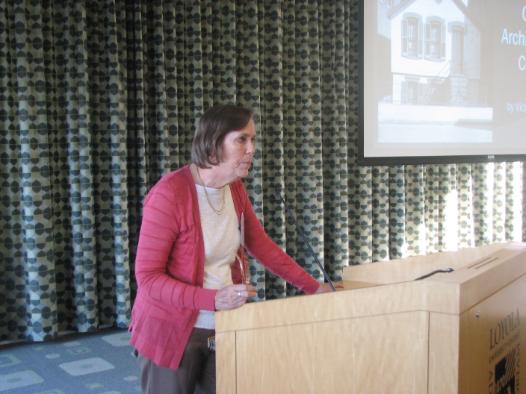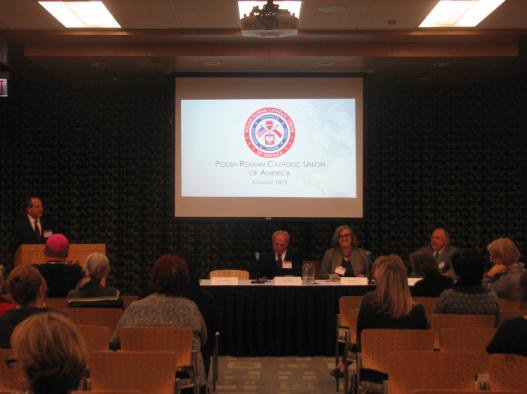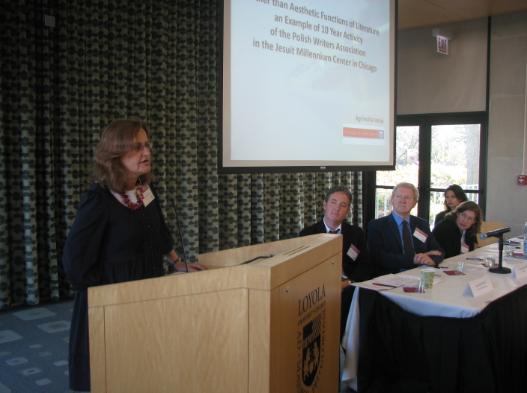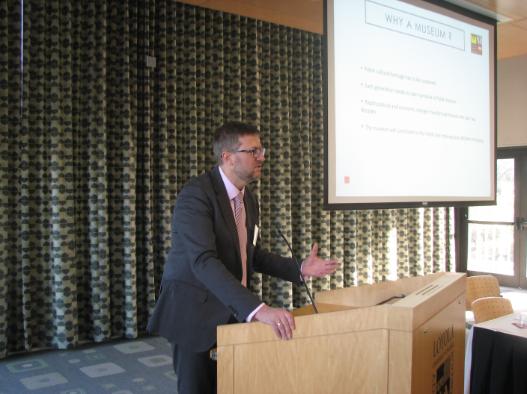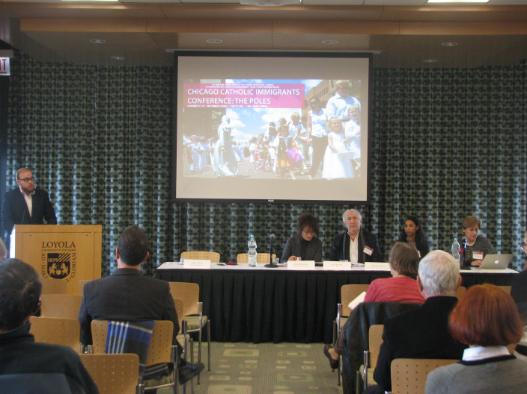The Chicago Catholic Immigrants Conference: The Poles
CHIEF OF STAFF
OFFICE OF THE PRESIDENT OF POLAND
REPUBLIC OF POLAND
Secretary of State
Adam Kwiatkowski
Warsaw, 13 November 2015
Organizers and Participants of “Chicago Catholic Immigrants Conference: The Poles” at Loyola University Chicago
Fellow compatriots! Ladies and Gentlemen!
On behalf of the President of the Republic of Poland, Andrzej Duda, and myself, I am sending warm greetings to everyone gathered at Loyola University in Chicago for the “Chicago Catholic Immigrants Conference: The Poles.” I am very pleased that Polonia is working to cultivate its national identity and passing on the history of their homeland to the younger generation, an integral part of which is the history of Poles in America.
The service of the Catholic Church for the Polish community in the United States is cannot be underestimated. Spreading the Good Word and Christian values, the Church helps to maintain an unfailing moral compass in the expanse of freedom offered by the New World. Faith also plays an important integrational role for the American Polonia. Polish parishes and religious associations contribute to maintaining family traditions and customs through emigrants and their descendants. The contribution of the priests to spreading Polish language and culture is remarkable. In large part, it is thanks to them that Poles remain faithful to their heritage, while contributing to the diversity and richness of the multiethnic and multi-faith mosaic of America.
For all of their contributions I would like to warmly thank the clergy, monastic orders and religious movements, along with all who are involved with Polish life across the ocean. Thank you, for ensuring that Polish matters to continue to be inalienably close. Poles who settled in the United States always did a lot of good for their homeland. They actively supported their countrymen in the fight for independence throughout both world wars, during the struggle with communism, and lobbied for Poland to be included in the North Atlantic Treaty Organization. For this, the Republic is deeply grateful.
I want to equally ensure – on behalf of the President and all of us Poles living in Poland – that Polonia is an integral part of our national community. We need, however, more active efforts to maintain a lively and mutual contact between our compatriots living in Poland and abroad. For this reason the President has willed the creation of an Office for Contact with Poles Abroad in the Chancellery of the President of the Republic of Poland, the work of which I oversee. I am counting on the collaboration with Polonia in Chicago. I trust that together we will be able to accomplish much good for our citizens in Poland and in the United States.
With regards and warm greetings,
Adam Kwiatkowski
(Trans. by Ola McLees)

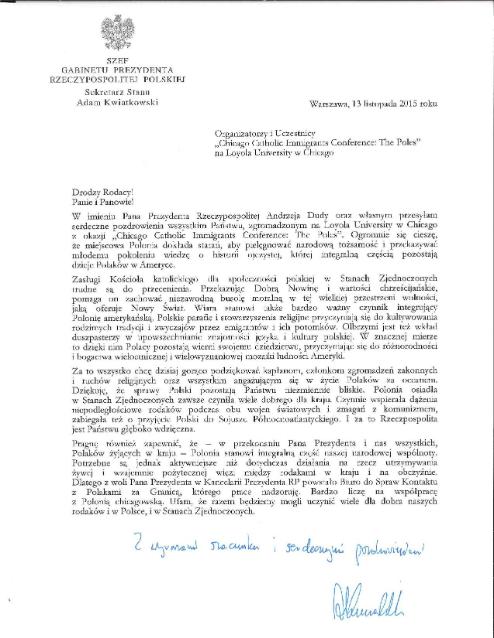
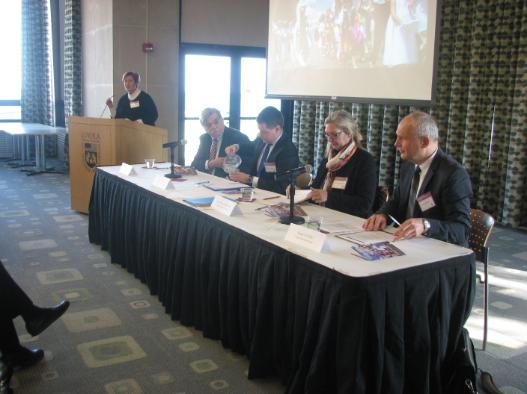
From left: Bozena Nowicka McLees, Dominic Pacyga, Bartosz Rydlinski, Mary Erdmans, Marek Suszko
"Poles cannot understand themselves without reference to their Christianity," said the Most Reverend Andrew P. Wypych, Auxiliary Bishop, Archdiocese of Chicago, in his opening keynote address at the "Chicago Catholic Immigrants Conference: The Poles," held November 13-14 at Loyola University Chicago's Lake Shore Campus. Over the course of the two-day conference, participants learned how integral the Catholic Church –has been to the Polish community in Chicago, especially in the early years. The "nickels and dimes" that Polish Chicagoans contributed a century ago to build the many magnificent Polish cathedrals and churches in the city "showed that Poles were rich people spiritually, even if they were standing at the bottom of the (economic and social) ladder," said Bishop Wypych.
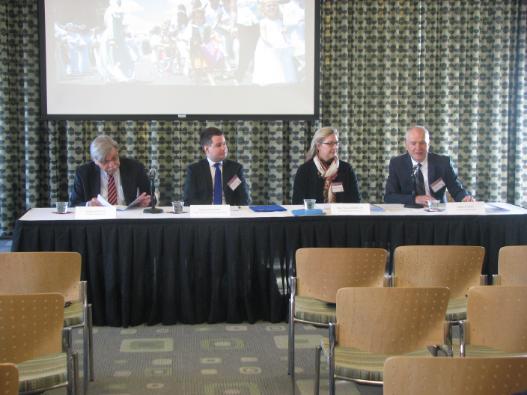
From left: Dominic Pacyga, Bartosz Rydlinski, Mary Erdmans, Marek Suszko
The conference offered a rich variety of views about the relationship between the Catholic Church and the Polish community, including nine panels on topics ranging from the Polish imagination in literature to the history of fraternal organizations in the community to the outlook of Loyola students and recent graduates of Polish heritage today on growing up Polish.
"I came to this conference fearing that it would be a snooze," one participant confessed over lunch on Day Two. "But I came away electrified by the presentations, including new material presented by scholars from Poland and the United States. The conference opened my eyes to what a rich treasure trove of scholarly work remains to be done in exploring Polish studies in Chicago."
Among the eye-opening presentations was one by Bartosz Rydlinski, a professor at the Cardinal Stefan Wyszynski University in Warsaw, who studied turn-of-the-19th century Polish Socialist Party movement in the Chicago immigrant community. Dr. Rydlinski found that while the socialists promoted secularism, their arguments drew heavily on Catholic social justice doctrine to attract recruits. Some of the socialist arguments were that workers should be "important shareholders" in their work; that "the rich should pay more taxes," and that capitalism was inherently "a source of moral corruption," he said. In criticizing the capitalist system, the socialists argued that people too frequently got married "not for love but for economic advancement." They also made an early case for gender equality, supporting "equal pay for equal work for women." However, Dr. Rydlinski pointed out, from the beginning, the Vatican "opposed leftist parties" with Polish priests in Chicago falling in line, routinely "warning workers against the socialists."
Notable among the American scholars who have focused on the Polish Catholic experience in Chicago was Dr. Dominic A. Pacyga, professor at Columbia College Chicago and author of numerous books, including the celebrated new Slaughterhouse: Chicago's Union Stack Yard and the World It Made. In his remarks, Professor Pacyga described the pervasive "anti-immigrant and anti-Catholic sentiment" in the larger community that combined to knit the Polish community closer together, especially at the family level where "the idea of Polish family was central" to every Pole's identity. To preserve their Polish heritage and pass on their faith, language, and culture to future generations, he said, Poles constructed parochial schools and some 60 Polish parishes in Chicago in relatively short order, but even in such a tight-knit community, differences emerged, including a rift between the two major fraternal organizations over the definition of "a true Pole." Members of the Polish National Alliance defined it as "anyone who believed in Poland," while the position of the Polish Roman Catholic Union was that "you're only Polish if you're Catholic." There was no disputing the assertion of Donald Pienkos, Professor Emeritus at University of Wisconsin-Milwaukee, who said that for Poles in Chicago "churches were more than centers for religion; they were centers of culture."
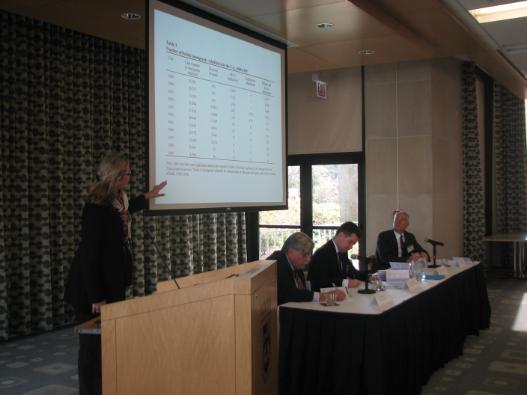
From left: Mary Erdmans, Dominic Pacyga, Bartosz Rydlinski, Marek Suszko
Mary Patrice Erdmans, Associate Professor of Sociology at Case Western Reserve University in Cleveland and author of several books, including the celebrated The Grasinski Girls: The Choices They Had and the Choices They Made, looked at Polish immigrant communities in Chicago from 1970 to 2000 and pointed to the migration of inner-city Poles to the suburbs and the community's transformation into an "immigrant ethnic consumer community." The larger trend became that many "suburban Poles began integrating into Catholic parishes" while drifting away from the Polish language and Polish community parishes.
Architectural historian Victoria Granacki, author of Chicago's Polish Downtowns, gave a "virtual tour" of some 18 Polish parishes in the city, the majority of which were designed in the classic Renaissance and Baroque Revival style. Most notable among them were the famed St. Stanislaus Kostka, Holy Trinity, and St. John Cantius churches. Her presentation included exterior and interior photos of most featured churches. Today, Granacki said, "there are 51 parishes in the Chicago archdiocese (Cook and Lake counties) that offer masses in Polish."
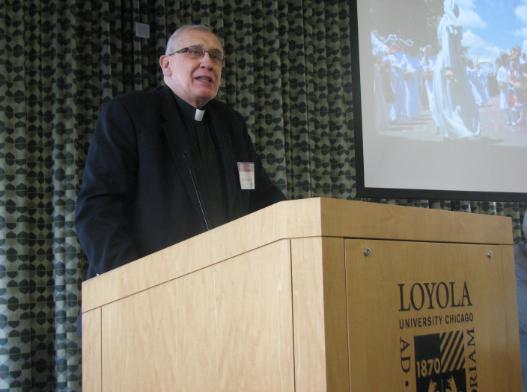
Father John Pawlikowski, OSM, Catholic Theological Union
The Saturday keynote speaker was author Stuart Dybek, a distinguished writer-in-residence at Northwestern University and a Loyola alumnus. Dybek spoke from the heart about his identity as the child of Polish immigrants. "It's an enormous urge of immigrant writers to uncover the generation before them: Who are our parents, and what are they hiding?" The men in his family, he said, were all "busted by the experience" of immigration and dislocation, while the women maintained their strength and essentially raised him. They were called bousha's -- not “babcia,” he said, affirming the Chicago vernacular for the Polish word for grandmother. "Memories are scars," he said. "Writing as an immigrant writer, you pick out the scars."
A panel on the “Polish Catholic Experience in Literature” followed Dybek's riveting opening and included such distinguished writers as Leonard Kniffel, author of A Polish Son in the Fatherland; Brigid Pasulka, author of A Long, Long Time Ago & Essentially True, and playwright Martyna Majok speaking to their Polish identities. Confirmed as a Catholic in 1956, Kniffel essentially put his Polishness and Catholicism on the shelf until the death of his mother in 1996. That experience led him to a seven-month, root-seeking sabbatical in Poland and a fascination with his heritage. Today, the retired editor and publisher of American Libraries magazine authors a blog called A Polish Son. www.PolishSon.com
Pasulka spoke movingly about writing through the lens of religion, "My eyes are Catholic shaped," she said. Majok described her perilous immigrant experience in New Jersey, complete with her mother's raw fight for survival amid sexual abuse and financial uncertainty -- experiences Majok has transformed vividly for the stage in such plays as Ironbound, which was performed at Chicago's Steppenwolf Theatre this year and is headed for New York in 2016. "Even if you renounce your Catholicism," she said, "you're still bound up in it."
Sponsored by the Hank Center for the Catholic Intellectual Heritage and the Interdisciplinary Polish Studies Program, the conference broke new ground and by all accounts was a resounding success, based on strong turnout, riveting presentations, and lively discussions.
"While the Polish community in Chicago has triumphed, based on a long string of accomplishments, including statistics demonstrating its economic success, we are still hurting," remarked conference organizer Professor Bozena Nowicka McLees, who is also the chair of Loyola's Polish Studies Department. The conference, she said, "was holistic in the sense that healing took place."
Text by Wanda Urbanska
Photos courtesy of the Hank Center

